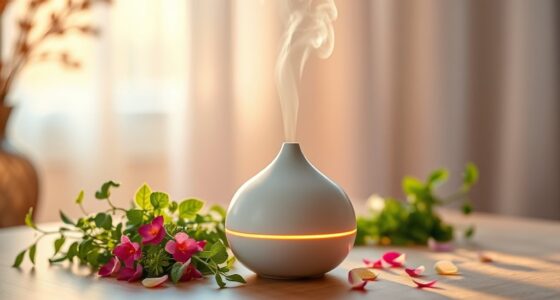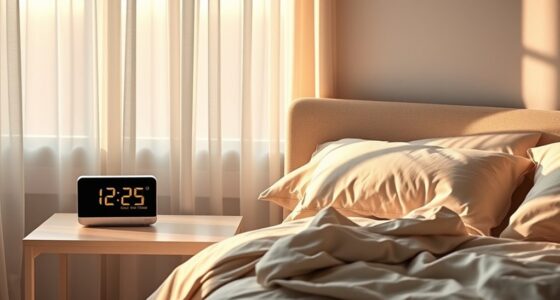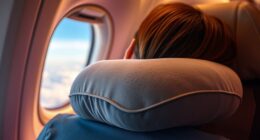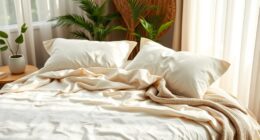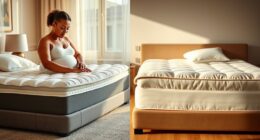Blue light from screens can disrupt your sleep by suppressing melatonin and messing with your circadian rhythm. Blue light glasses may help reduce eye strain and some sleep issues, but their effectiveness varies based on the quality of the glasses and your sensitivity. They’re not a miracle cure, and good sleep habits matter just as much. To find out how you can better protect your sleep, see what the experts say below.
Key Takeaways
- Blue light exposure before bed suppresses melatonin, disrupting sleep, but evidence on blue light glasses improving sleep is mixed.
- Blue light glasses can reduce eye strain from screens but do not guarantee better sleep quality.
- Managing screen time before bed and practicing good sleep hygiene are often more effective than relying solely on blue light glasses.
- The effectiveness of blue light glasses varies; they may help some individuals but are not a universal solution.
- Consulting credible sources and professionals can help determine if blue light glasses are suitable for your sleep and eye health needs.
Understanding Blue Light and Its Sources

Blue light is a high-energy visible light that naturally occurs in sunlight but is also emitted by many artificial sources. You encounter blue light daily through various blue light sources, especially digital screens like smartphones, tablets, computers, and LED TVs. These screens emit significant amounts of blue light, which helps improve screen visibility and color accuracy during the day. However, extended exposure to blue light from digital screens, especially at night, can disrupt your sleep patterns. While sunlight is the primary natural blue light source, the prevalence of artificial sources has increased your exposure indoors. Understanding where blue light comes from and how it affects you is key to managing your screen time and protecting your sleep quality. Incorporating powerful persuasive words into your awareness can help you better prioritize your sleep health and make informed choices about blue light exposure.
How Blue Light Affects Melatonin Production
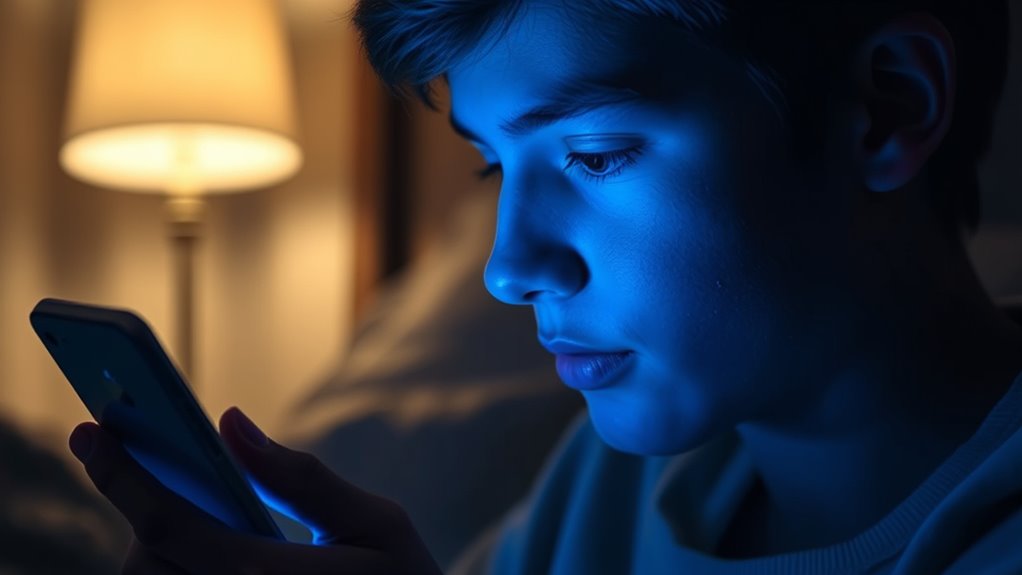
Exposure to blue light, especially during evening hours, can profoundly suppress the production of melatonin, the hormone responsible for regulating your sleep-wake cycle. Blue light’s specific light wavelength is particularly effective at signaling your brain that it’s daytime, leading to circadian disruption. When your eyes detect this light, they send signals to suppress melatonin release, making it harder to fall asleep and stay asleep. This disruption can shift your internal clock, affecting sleep quality and timing. The shorter wavelength of blue light penetrates deeply into your retina, intensifying its impact on melatonin suppression. As a result, exposure during evening hours interferes with your natural circadian rhythm, making it crucial to manage blue light exposure to maintain healthy sleep patterns.
The Science Behind Blue Light Glasses
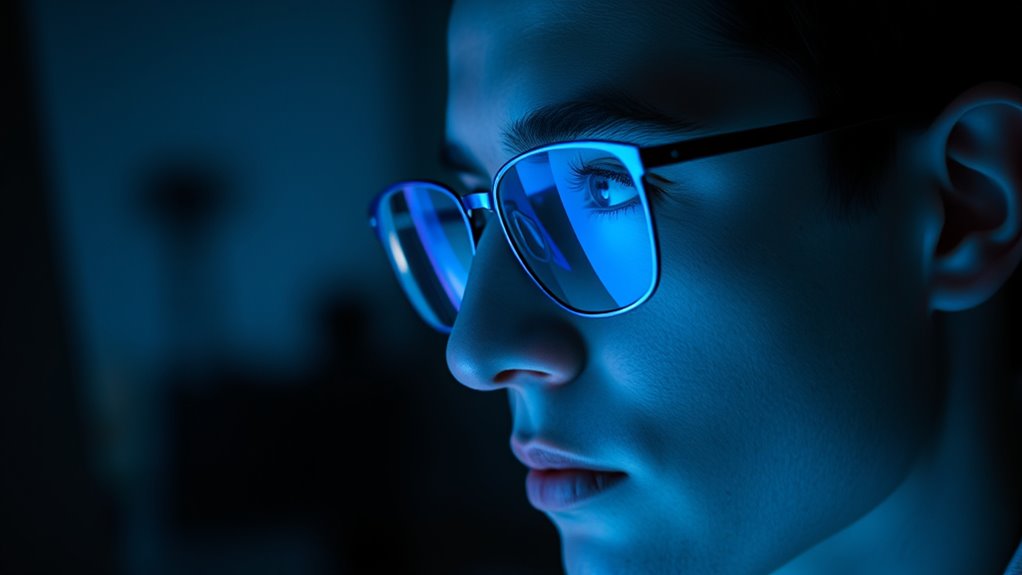
Blue light glasses are designed to filter or block a significant portion of blue light before it reaches your eyes. They aim to reduce eye strain caused by prolonged screen time and address common blue light myths that suggest they completely eliminate all blue light. While these glasses can lessen discomfort, they don’t prevent eye strain entirely, especially if underlying issues exist. The science shows that blue light filters may help protect your eyes from potential harm, but their effectiveness varies. Some studies suggest they can improve comfort during extended screen use, while others see limited benefits. It’s important to understand that blue light glasses aren’t magic solutions but tools that may support eye health when used properly. Additionally, research in the Retail industry indicates that customer awareness about blue light products influences their purchasing decisions, highlighting the importance of understanding their true benefits.
Research Findings on Blue Light and Sleep Quality
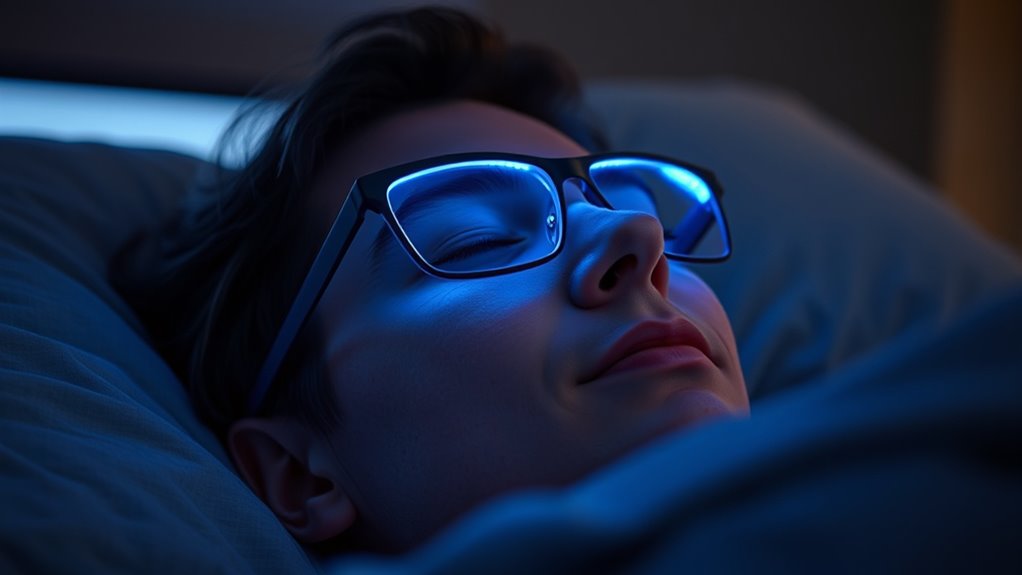
Research consistently shows that using screens before bed can disrupt your sleep quality. This happens because blue light affects your photoreceptor response in the eyes, signaling your brain that it’s daytime. When exposed to blue light in the evening, your circadian rhythm—the internal clock that regulates sleep-wake cycles—becomes disrupted. Studies reveal that blue light exposure suppresses melatonin production, making it harder to fall asleep and reducing sleep quality overall. Some research indicates that individuals exposed to blue light before bed experience increased sleep latency and lighter sleep stages. While the extent varies among people, the evidence suggests that blue light contributes considerably to circadian disruption, impacting sleep patterns. Recognizing these effects can help you make better choices about light exposure before bedtime. Additionally, using vetted products like Mother Baby Kids blue light glasses can mitigate some of these effects by filtering out the most disruptive wavelengths.
Effectiveness of Blue Light Filtering Devices

Since many people rely on screens late into the evening, blue light filtering devices have become a popular solution to mitigate sleep disruption. Your awareness of blue light’s impact has increased, prompting you to try these devices. However, their effectiveness varies. Some studies show blue light glasses and screen filters can reduce blue light exposure and improve sleep quality, while others find limited benefits. The key is understanding that device effectiveness depends on consistency and proper use. Not all filters block the same amount of blue light, and individual responses differ. To gauge whether these devices work for you, consider your sleep patterns and how much blue light you’re exposed to. Ultimately, increased blue light awareness helps you make informed choices about using these devices effectively. The importance of sound design techniques is also relevant when creating content that promotes healthy sleep habits.
Practical Tips for Improving Sleep in a Digital World
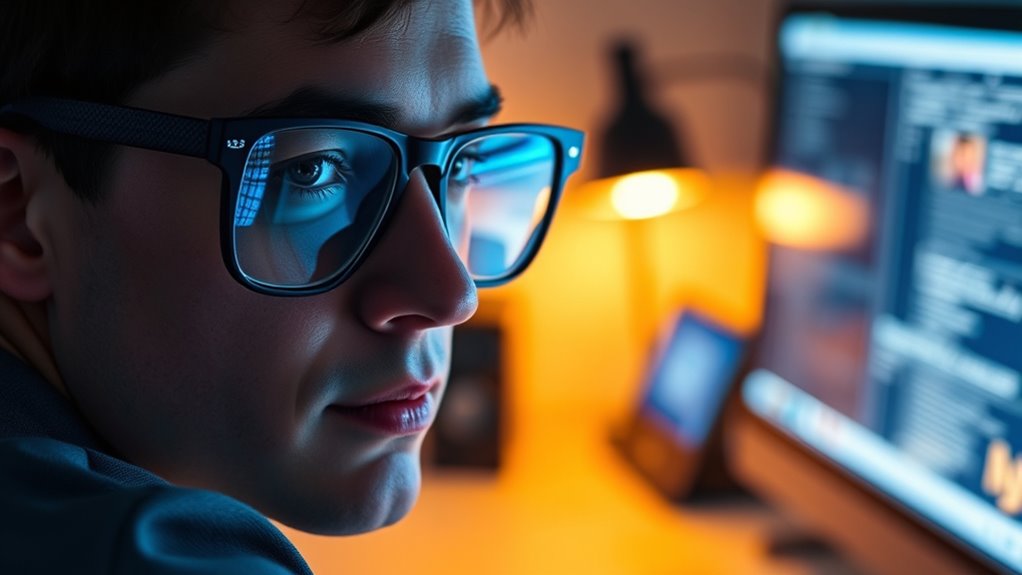
To improve your sleep in a digital world, start by reducing screen time before bed to limit blue light exposure. Establishing a consistent sleep schedule helps regulate your body’s internal clock and makes falling asleep easier. Small changes like these can markedly boost your overall sleep quality and well-being. Incorporating blue light glasses can further reduce blue light exposure and support better sleep hygiene.
Reduce Screen Time Before Bed
Reducing screen time before bed is one of the most effective ways to improve your sleep quality. Excessive screen use can contribute to screen addiction and disrupt your bedtime routines, making it harder to wind down. Cutting back on screens at least an hour before bed helps lower blue light exposure, supporting melatonin production. Establishing a digital curfew creates a healthier changeover from activity to rest. To implement this, consider the following:
- Turn off devices an hour before bedtime
- Replace screen time with relaxing activities like reading or meditation
- Keep screens out of the bedroom to reduce temptation
- Set a consistent wind-down routine to signal your body it’s time to sleep
- Understanding blue light and its effects on sleep can motivate you to limit your exposure, enhancing your overall sleep quality.
Establish Consistent Sleep Schedule
Maintaining a consistent sleep schedule is essential for improving your overall sleep quality, especially in a digital world filled with distractions. Going to bed and waking up at the same times helps regulate your internal clock, making it easier to fall asleep and wake refreshed. Establish a calming bedtime routine and optimize your sleep environment to reinforce this schedule. Use the following table to create a personalized plan:
| Bedtime Routine | Sleep Environment | Wake-Up Time |
|---|---|---|
| Turn off devices 30 min before bed | Keep room dark and cool | Set alarm for same time daily |
| Read or meditate | Use blackout curtains | Avoid snoozing in the morning |
| Limit caffeine | Minimize noise | Wake up naturally if possible |
Consistency is key—stick to your schedule even on weekends for better sleep health. Incorporating sleep hygiene practices can further enhance your sleep quality and overall well-being.
Making an Informed Choice About Blue Light Protection
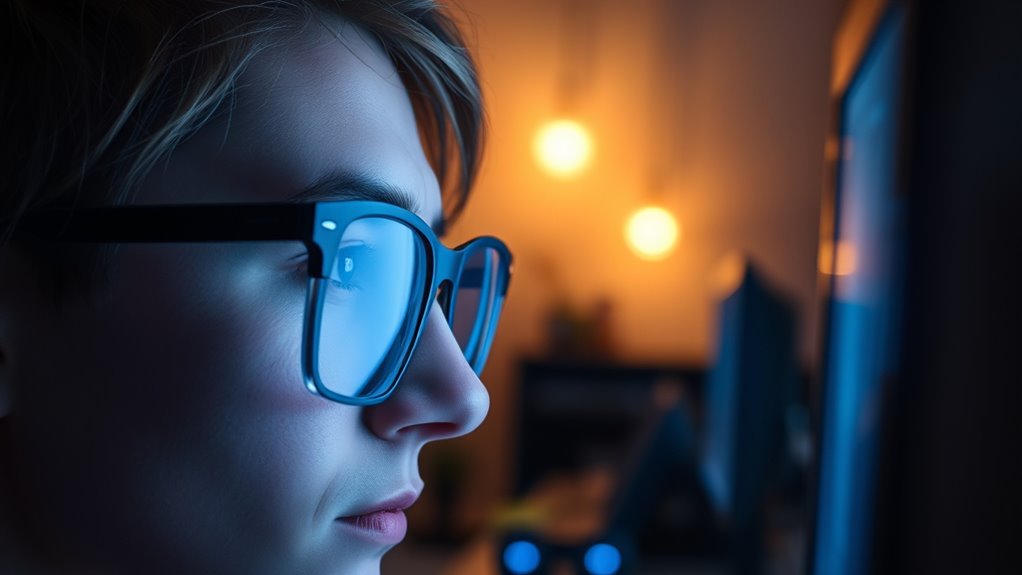
Understanding the potential impact of blue light on your sleep is essential for making informed decisions about protection. While some believe blue light glasses can prevent eye strain and improve sleep, many blue light myths persist. It’s important to evaluate credible evidence before investing in solutions. Consider these points:
- Not all blue light causes significant sleep disruption.
- Blue light glasses may reduce eye strain but don’t guarantee better sleep.
- Limiting screen time before bed can be just as effective.
- Assess your personal needs and consult eye care professionals if unsure.
- Reputable market reviews can help you choose quality blue light glasses backed by customer feedback.
Frequently Asked Questions
Can Blue Light Glasses Prevent Digital Eye Strain Effectively?
You wonder if blue light glasses can prevent digital eye strain effectively. While blue light filters in these glasses may reduce eye discomfort, they don’t eliminate eye strain completely. Wearing them can help lessen glare and digital fatigue, but taking regular breaks and adjusting screen brightness are just as important. So, blue light glasses can be a helpful part of your eye health routine, but they aren’t a complete solution.
Are There Any Long-Term Health Risks Associated With Blue Light Exposure?
You might wonder if long-term blue light exposure poses health risks. While research suggests blue light can disrupt your circadian rhythms and potentially impact retinal health over time, definitive conclusions are still emerging. To protect your health, it’s wise to limit screen time before bed and consider blue light glasses if exposure is unavoidable. Staying mindful of your blue light exposure helps support your overall well-being and eye health.
How Do Blue Light Glasses Compare to Screen Time Reduction?
Ever wonder if blue light filters are the magic fix? Compared to cutting down your screen time, they’re like putting a band-aid on a sinking ship. Managing your screen time is more effective because it reduces overall exposure, while glasses only block some blue light. So, if you want real sleep benefits, prioritize screen time management first, then consider blue light glasses as a helpful sidekick.
Do Blue Light Glasses Work Equally for Children and Adults?
You might wonder if blue light glasses work equally for children and adults. Age differences can influence their effectiveness, as children’s eyes are more sensitive to light. Some glasses come with prescription options, which can benefit those who need vision correction. While both groups can see benefits, kids might experience more comfort, but it’s crucial to choose the right fit and lenses for each age to maximize their impact.
Are There Specific Brands or Types of Blue Light Glasses Recommended?
When choosing blue light glasses, you should consider brand comparisons and style options to find the best fit for you. Look for reputable brands known for quality lenses and durability. Style options vary from sleek, minimalist designs to more colorful, fun frames, so pick what suits your personality and daily needs. Trying different brands and styles helps you discover which glasses are most comfortable and effective for reducing eye strain.
Conclusion
Now that you understand blue light’s impact, you can take control. Whether you choose blue light glasses, adjust your screen time, or create a calming bedtime routine, each step empowers you to protect your sleep. You deserve restful nights, clear mornings, and vibrant days. By making informed choices, you can prioritize your well-being, improve your sleep quality, and embrace a healthier digital life. Take action today for better sleep tomorrow.



